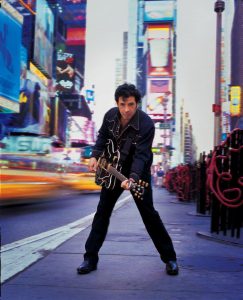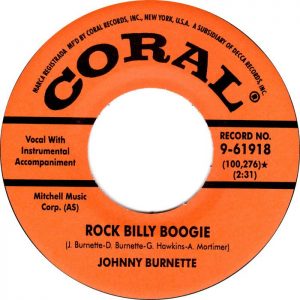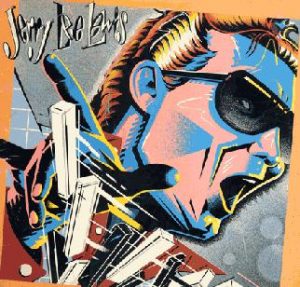by Jochen Markhorst
The name of Dorsey William “Billy” Burnette III will be mentioned in an still-to-be-written Great Definite Rock Encyclopedia. Billy is visible to the general public from 1987 to 1995, when he is a member of Fleetwood Mac. Dylan fans know him from the three weeks in February 2003, when he replaces guitarist Charlie Sexton in Dylan’s band, during the eleven concerts in Australia and New Zealand. After that, he plays for years in the band of another legend, John Fogerty. But he is truly immortal thanks to the song written by his father Dorsey and his uncle Johnny Burnette, the founders of The Rock and Roll Trio: “Rock Billy Boogie”. Dorsey and his brother Johnny become fathers around the same time in 1953. Johnny calls his son Rocky, Dorsey chooses the name Billy and together they write a song about their new happiness. It becomes a popular, frequently covered song, and its title gradually turns into “Rockabilly Boogie”, due to the way Johnny Burnette sings it – and that is where the genre designation ‘rockabilly’ originates from.
The young Billy is spoon-fed with rock and roll, when he is seven years old, in 1960, he sings on a Rick Nelson single, “Hey Daddy (I’m Gonna Tell Santa On You)”, plays on countless records and also has about twenty solo albums to his name.
Enough topics of conversation, all in all, for the recordings of the StageLeft podcast in 2015. Burnette is an entertaining narrator, with an inside knowledge of the bigger artists and an open eye for the smaller absurdities. If he perhaps has learned to distinguish a Great Common Denominator from all those big artists with whom he has worked, the interviewer wants to know. “Well I tell you what’s weird with about all these guys that I’ve worked with,” Burnette replies, “ all of them are Gemini’s. Bob’s a Gemini, Stevie Nicks is a Gemini, John Fogerty is a Gemini, so you never know what you gonna get (laughs).”
With that last remark, Burnette is referring to the anecdote he has just told about his tour experience with Dylan:
“I think I learned a 120 song in like a month and a half or something. It was like… we’d only get the setlist five minutes before the show started, no, I got it twenty minutes before the show started, and there would be five new songs on it, which I had to learn really quick. So it was challenging. (…) It was all different. He may change the key from night to night. Because it sounds better in this key today. It was a wild ride, but I really loved it.”
The interviewer would love to hear more about Dylan, but Burnette does not have a lot to offer:
“He is a very private person. But we talked a lot about my dad and my uncle. He was a fan of some of their music. He was a big Rick Nelson fan (the Burnette brothers have worked a lot with Nelson and have also written a few of his hits). So, he really liked that stuff and… I had actually met him in the seventies, and he told me that my Dad’s song, “Tall Oak Tree”, he said he realised that was the first ecology song ever written. And I called my dad the next morning, and I said ‘Hey Dad, I ran into Bob Dylan’. That’s neat, you know.
And then both Billy and Dylan still ignore, out of ignorance or discretion, that Dylan lovingly stole one of the most covered songs by Pa Burnette and Uncle Burnette, “Bertha Lou” from 1957, and has turned it into “Rita May”.
https://www.youtube.com/watch?v=bMwoxn-WHiQ
At least, that is meanwhile the communis opinio among Dylan biographers, on the fansites, on Wikipedia even and in rockabilly circles; Dylan has copied the music of “Bertha Lou” note by note for that curious little piece of the Desire sessions.
There is, however, something to be said about this. Agreed, Dylan certainly knows “Bertha Lou”. Apart from that interview with Billy, we know his respect for the Burnette brothers thanks to his Theme Time Radio Hour program, in which he runs “Lonesome Train (On A Lonesome Track)” and publicly praises the rawness of The Johnny Burnette Rock ‘n’ Roll Trio.
And “Bertha Lou” is a most famous song, is still played regularly (by Robert Gordon, for example) to this day. But at the same time it is a dima a dozen song. The chords follow a regular blues scheme, the bridge is just as run-of-the-mill and the riff we heard in plenty songs before “Bertha Lou” (“Money” by Barrett Strong, “Brand New Cadillac” by Vince Taylor, Henry Mancini’s “Peter Gunn Theme “), as well as in later songs (Jack Bedient’s “Double Whammy”, Springsteen’s “Pink Cadillac”, “Planet Claire” from The B-52’s).
The same applies to the title. The identical rhythm, a dactylus, of the girl’s names Rita May and Bertha Lou has been used hundreds of times and will always remain popular. Peggy Sue, Billie Jean, Carrie Anne, Maggie Mae, Mary Jane, Susie Q, Bobby Jean, Ida Red, Mary Lou … the list of celebrated girls with first names in this meter is endless.
Just as established as the disputable “Bertha Lou”-connection is the statement that this song is a sneer, or a wink, or at least a joke directed at the writer Rita Mae Brown. However, we do not have much more than the identical first name (originally also spelled as Rita Mae, by the way), to make that click. The song is written shortly after Brown had her breakthrough with the semi-autobiographical novel Ruby Fruit Jungle, one of the first novels with lesbian themes, a very intelligent, witty and moving work. If Dylan and co-author Jacques Levy were really aiming at her, then lines like ‘How’d you ever get that way’ and ‘What’s that crazy place you’re in’ would breathe a quite unsavoury, homophobic flavor, which is rather atypical for both Dylan and Levy .
That is not the only thing that speaks against that Rita Mae Brown link. Dylan sings often enough about known and lesser known contemporaries, and is never ambiguous or foggy. William Zantzinger, Ruben ‘Hurricane’ Carter, Lenny Bruce, Woody Guthrie, George Jackson … these are just a few examples of Dylan’s habit of being completely clear about the identity of the source of inspiration.
And then we also have the written statement from Claudia Levy. When Tony Attwood in his piece about “Rita May” (here on Untold, May 31, 2016) also presumes that Levy and Dylan have crafted a misplaced parody on the writer, and on top of that wonders whether Levy actually does have a bad influence on Dylan, Claudia Levy, Jacques Levy’s widow, can no longer withhold:
Dear Mr. Attwood;
You are terribly wrong about the song, Rita Mae” and Mr. Levy. Mr. Levy had the utmost regard for Rita Mae Brown. He was interested in working with her on a theatrical production. Mr. Levy had been preparing to do an evening of poetry by feminist writers. As you may know, Jacques Levy was a theatrical director, known for doing iconoclastic plays. The song was a parody of prevalent attitudes toward women. He thought “Rubyfruit Jungle” was witty and brilliant. He bought copies of “The Rubyfruit Jungle” to give to friends among them Kurt Vonnegut.
The disgruntled widow misspells a name, the song title and the book title (twice), and it is also a bit strange how she calls her late husband ‘Mr. Levy’, but plausible, music-historical value her tirade has nonetheless. Not so much because of her interpretation that the song would be a ‘parody of prevailing attitudes toward women’ – Claudia was not yet in Levy’s life when the men wrote the song, in 1975, and it is unlikely that the rather obscure song, a petty footnote in Levy’s rich career, has ever been the subject of discussion at the marital dining room table. But after twenty-five years of marriage she has of course gained a well-founded insight into the man’s motives, his sense of humour and his respect for a writer like Brown. That also explains why Levy and / or Dylan change the name (from Mae to May) in the second instance – apparently they want to avoid the association with Mrs Brown.
In the Prism Films interview shortly before his death in 2004, Levy himself casts a sobering light on “Rita May”. In general, he has already mentioned how much Dylan enjoys putting together original rhymes, and that pleasure we recognise in this song anyway: nonchalant – that I want, puffin ‘- nothing and college – knowledge, in particular. But “Rita May” is also specifically mentioned twice. The first time when he, with a charming, boyish grin, reveals that he has some secret treasures from that time somewhere in the house. “There’s a couple of songs that never got on the album. It’s kinda funny. There’s a version of Rita May that’s just a joke.” It gets more substantial when Levy addresses the exotic side of Desire:
There are other things, like Rita May, which is a kind of… Gene Pitney could sing Rita May, you know. It’s a simple fifties rock thing, which is part of my background and Bob’s background too. And in a way… I know this is gonna sound strange, but one of my favourite albums of Bob is Self Portrait. Now, I know that’s the album that is dropped out of everybody’s collection, everybody’s mind. But it is an album on which he tried to go back and do those songs that fit him, that made him who he was. And I like that. I like that album because of that. So that’s the other side of it. It was exotic, but there’s also some aspects of autobiography.
And thus the story behind “Rita May” is closing and rounding. Two thirty-somethings with writing talent are in a nostalgic mood and craft a nice little ‘fifties rock thing’ full of cheerful linguistic pleasure. Rockabilly as rockabilly should be.
That is also recognised by one of the greatest pioneers of rockabilly, Jerry Lee Lewis. In ’79 The Killer records a smashing, steamy cover of “Rita May”, the only cover altogether worth mentioning, and, according to tradition, shows his unworldliness when he asks producer Bones Howe: “Who wrote that song?”
“Bob Dylan,” Howe replies with a broad grin, for he is sure Lewis will be mighty surprised. But The Killer shows no recognition at all. “That boy’s good,” Jerry Lee Lewis says, “I’ll do anything by him.”
Rita May by Bob Dylan and Jacques Levy: the antidote to Joey or once more misguided?
A footnote from Tony Attwood. I’m always very willing to be proven wrong, and in writing all these Dylan reviews I’ve been proven wrong many a time. But over the 10 years of running this site I have just very occasionally had a phone call or email from someone in the business who makes it clear he/she does not want to be quoted in anyway, or have what he/she tells me attributed, but the individual wants to say “you’re dead right on that one”. Or the reverse! And I had one such call in relation to this song which made it clear Dylan was in retrospect unhappy with it.
Of course this is not proof, and I’m not going to provide more info, because that was the deal, so I’m happy to publish Jochen’s article which is as always packed full of interest. And of course you can decide for yourself.
What else is on the site
You’ll find an index to our latest posts arranged by themes and subjects on the home page. You can also see details of our main sections on this site at the top of this page under the picture.
The index to the 500+ Dylan compositions reviewed is now on a new page of its own. You will find it here. It contains reviews of every Dylan composition that we can find a recording of – if you know of anything we have missed please do write in.
We also have a discussion group “Untold Dylan” on Facebook. Just type the phrase “Untold Dylan” in, on your Facebook page or follow this link
And please do note The Bob Dylan Project, which lists every Dylan song in alphabetical order, and has links to licensed recordings and performances by Dylan and by other artists, is starting to link back to our reviews.




‘Dropped out of everyone’s collection, mind …..’?
When are writers ever going to learn not to ever make such all-inclusive statements, and thereby lose a certain amount of credibility by doing so….Jochen, you do not know that, and my collection tells me you are absolutely incorrect in making such a statement!
Uhmm… which statement, Larry? The Self Portrait- statement? That is not mine (I quoted Levy). To reassure: I like Self Portrait. It introduced me to It Hurts Me Too and Little Sadie, for one thing.
Jochen, thanks for the clarification ….my statement is wrongly directed at you….. I hanged myself on the colon (:) which I missed!
alles klar, Larry!
Hello there, Thank you for posting this analysis of a song from Bob Dylan’s Music Box: http://thebobdylanproject.com/Song/id/523/Rita-MayCome and join us inside and listen to every song composed, recorded or performed by Bob Dylan, plus all the great covers streaming on YouTube, Spotify, Deezer and SoundCloud plus so much more… including this link.